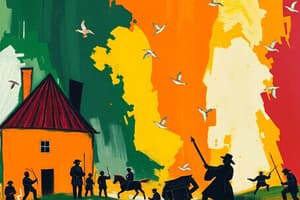Podcast
Questions and Answers
What are some common causes of rebellions throughout history?
What are some common causes of rebellions throughout history?
Some common causes of rebellions include economic hardship, excessive taxation, oppressive governance, religious conflicts, and denial of civil liberties.
Describe the types of rebellions based on their form and motivation.
Describe the types of rebellions based on their form and motivation.
Types of rebellions include civil wars, insurgencies using guerrilla tactics, military coups seizing power from civilian leadership, and separatist movements seeking independence for regions or ethnic minorities within a larger nation.
How did financial burdens imposed by Britain contribute to the American Revolution?
How did financial burdens imposed by Britain contribute to the American Revolution?
Financial burdens like the Stamp Act, Tea Act, and Townshend Duties imposed by Britain led to unrest among colonists who eventually rebelled.
What drove the Third Estate in the French Revolution to rebel?
What drove the Third Estate in the French Revolution to rebel?
Explain the impact rebellions can have on societies and political landscapes.
Explain the impact rebellions can have on societies and political landscapes.
What major social and political changes can successful rebellions result in?
What major social and political changes can successful rebellions result in?
What are some strategies that rebels use to resist oppression without resorting to violence?
What are some strategies that rebels use to resist oppression without resorting to violence?
Name a famous rebellion that spread rapidly through social media in modern times.
Name a famous rebellion that spread rapidly through social media in modern times.
What type of warfare involves small groups engaging in surprise attacks on larger forces?
What type of warfare involves small groups engaging in surprise attacks on larger forces?
Which rebellion in 1791–1804 led to the independence of a Caribbean country?
Which rebellion in 1791–1804 led to the independence of a Caribbean country?
Flashcards are hidden until you start studying
Study Notes
Rebellions: Causes, Types, Impacts, Famous Examples, Strategies
Throughout history, rebellions have been a significant factor in shaping societies and political landscapes. They can occur when people feel oppressed, marginalized, or dissatisfied with their circumstances. These collective acts of defiance against authority often force change and can lead to profound societal shifts.
Causes of Rebellions
Rebellions manifest due to various causes. Some common reasons include economic hardship, excessive taxation, oppressive governance, religious conflicts, and denial of civil liberties. For instance, during the American Revolution, financial burdens imposed by Britain—like the Stamp Act, Tea Act, and Townshend Duties—led to unrest among colonists who eventually rebelled. Similarly, in the French Revolution, the Third Estate was driven by anger over poverty and inequality, leading to the storming of the Bastille.
Types of Rebellions
There are several classifications of rebellions based on their form and motivation. Civil wars, where two opposing factions within a state fight each other, can be considered a type of rebellion. Insurgencies, which involve small groups using guerrilla tactics against government forces, also fall into this category. Military coups, where the armed forces seize power from civilian leadership, are another form of rebellion. In some cases, separatist movements seek independence for regions or ethnic minorities within a larger nation.
Impact of Rebellions
The effects of rebellions can vary significantly depending on the outcome. They can result in major social and political changes if successful. For example, the French Revolution led to the replacement of monarchy with the First French Republic and later the Napoleonic Empire. On the other hand, failures can lead to counter-attacks from authorities and increased suppression of dissent. Rebellions often leave lasting marks on societies, influencing future political arrangements and social structures.
Famous Examples of Rebellion
Throughout history, there have been numerous rebellions that have shaped the world we live in today. The Zulu Revolt in South Africa in 1857 was a significant event that affected British colonial policies. In modern times, the Arab Spring revolts across North Africa and the Middle East were notable for their rapid spread via social media and their impact on regional politics. Other famous examples include the Haitian Revolution (1791–1804), the Indian Rebellion of 1857, and the Chinese Cultural Revolution (1966–1976).
Strategies of Rebellions
Rebels often employ various strategies to gain support, overthrow authority, or achieve their goals. These can include propaganda campaigns to spread ideas and galvanize public opinion. Nonviolent resistance is another strategy used by rebels to resist oppression without resorting to violence. Guerrilla warfare involves small groups engaging in surprise attacks on larger forces, making use of hit-and-run tactics.
In conclusion, rebellions are complex phenomena with multiple causes, types, impacts, and strategies. They have played a significant role in shaping history and continue to do so as they challenge established power structures in pursuit of change. Understanding these aspects of rebellions provides insights into past events and helps us comprehend current global dynamics.
Studying That Suits You
Use AI to generate personalized quizzes and flashcards to suit your learning preferences.




